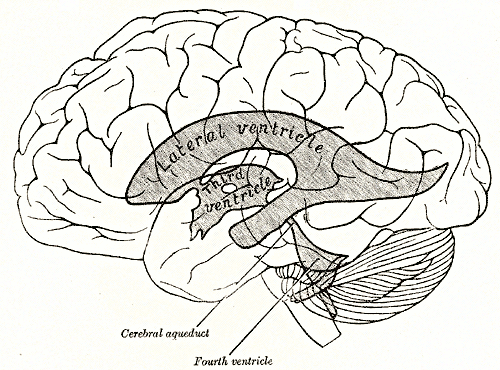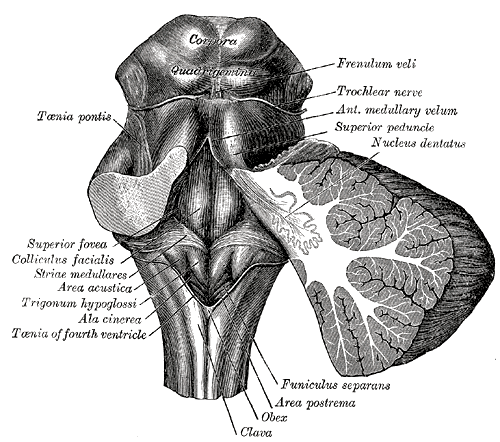This prompted a discussion between Bunny and I about viruses in general and her body's defenses against them. There's a few different tactics based on the type of virus - sometimes it's runny nose and coughing and sometimes it's vomiting (and we've been through them all) - for your body to try to rid itself of the virus. But what Bunny was really interested in was more the how - if food is supposed to go through your digestive system in a downward fashion, why does it all of a sudden go the other way and how is it doing that?
So, vomiting, throwing up, puking, blowing chunks (technically emesis) - is the forceful expulsion of the contents of one's stomach through the mouth and sometimes the nose. (Thanks wikipedia). And there's a ton of underlying reasons why it happens but regardless of the why, how the event itself happens is pretty consistent.
Your brain has a "vomit trigger" zone. It's in the fourth ventricle of your brain and is called the area postrema. The stimulation of this zone, by various methods, is what causes your body to start the expulsion routine.
These are from Gray's Anatomy (the book, not the show):
So there's a few ways to get this party started (although often this kind of ends the party) through chemoreceptors and that can be through blood-borne toxins and drugs, the vestibular system (which we talked about with motion sickness), cranial nerves through your pharynx (gag reflex), central nervous system (stress and psychiatric issues) and the enteric nervous system which tells your brain about the state of your gastrointestinal (GI) system. For Beans and Bunny it was that last one - irritation of the GI system through a viral infection - gastroenteritis, our tummy bug.
Once it's triggered it sends messages out to the rest of the body on how to react which results your body prepping itself for the big show - this happens quickly and gives you that "oh no, I'm going to puke" feeling. An amazing number of things happen simultaneously - you produce more saliva to protect your teeth from stomach acid, your lungs fill so that you don't breathe vomit later, you sweat and your heart rate increases. While all that is going on your small intestine starts to work in reverse and sweeps your digestive tract contents into your stomach, then your abdominal muscles contract forcing everything into your esophagus and then finally out your mouth. There are usually a bunch of sphincters (like one way valves) that prevent this from occuring randomly, but during this process they all relax. The stomach and esophagus themselves don't do much other than relax and provide an open pathway for exit. Bunny thinks this whole process is really cool, particularly the saliva protection thing, but overall it's still also really gross.
 |
| http://www.dizziness-and-balance.com/treatment/drug/emesis.html |
There are two phases - the "retching" phase - where your abdominal muscles contract with the diaphragm and breathing muscles all together. Next is the "expulsive" phase - which is exactly as it sounds. Pressure has built up in the stomach thanks to the diaphragm and abdominal muscles. That pressure gets released when the esophagus releases what is usually a one-way valve and whoosh - eggs and toast in the parking lot. The only good part is that pressure release and some associated endorphins make you temporarily feel better.
As I have decided not to put in any pictures of people vomiting, here is a picture of Beans and Bunny enjoying a post-virus treat that did not end up in reverse. I am now living in a state of fear as it's only a matter of time...I know it's coming for me.






